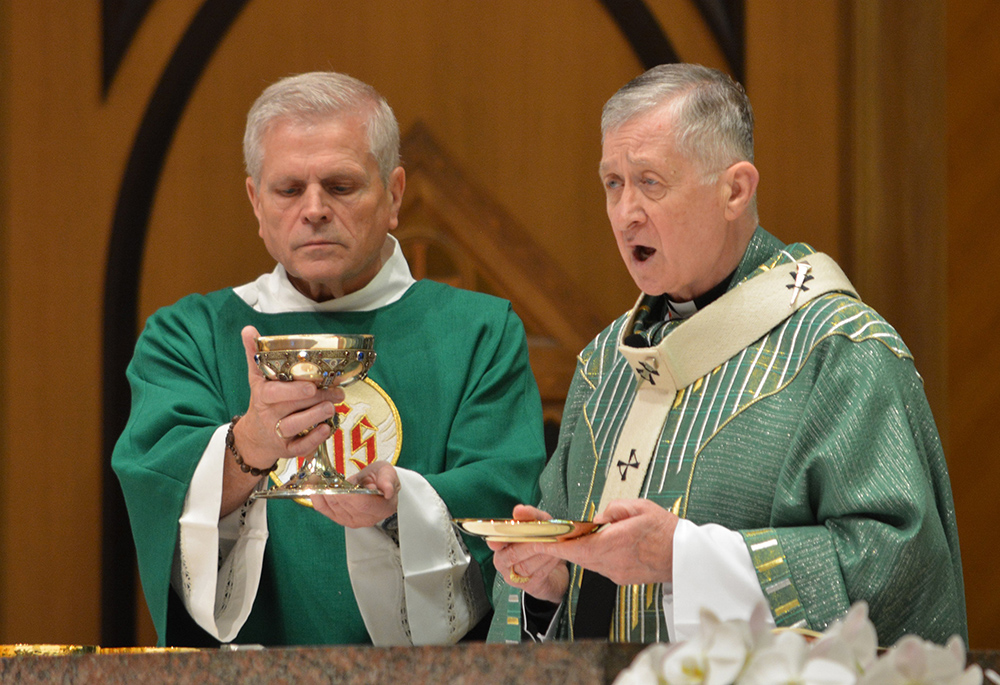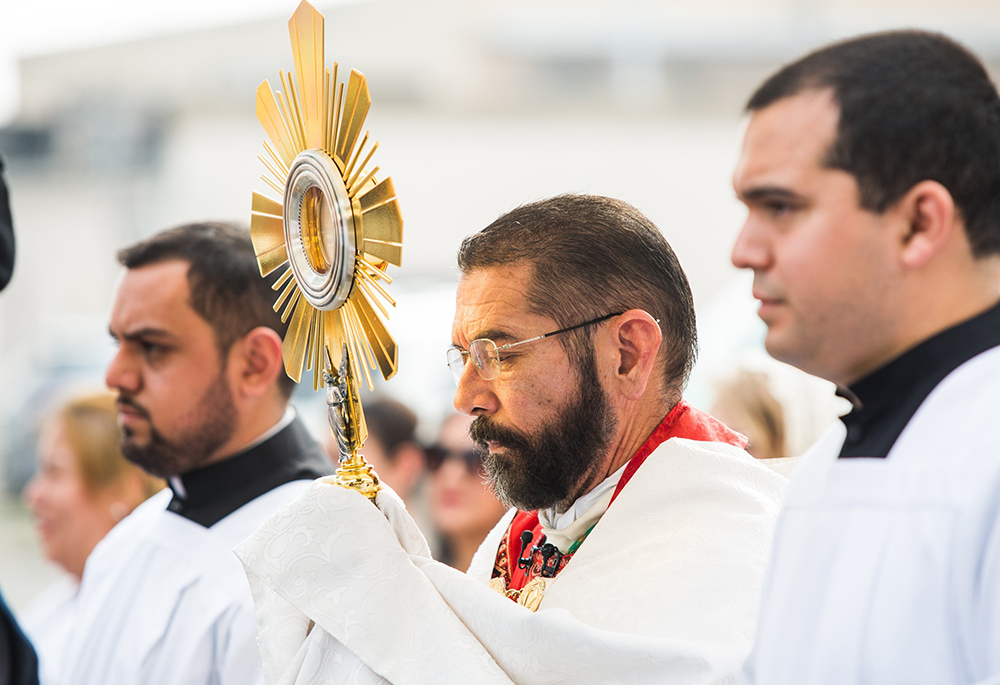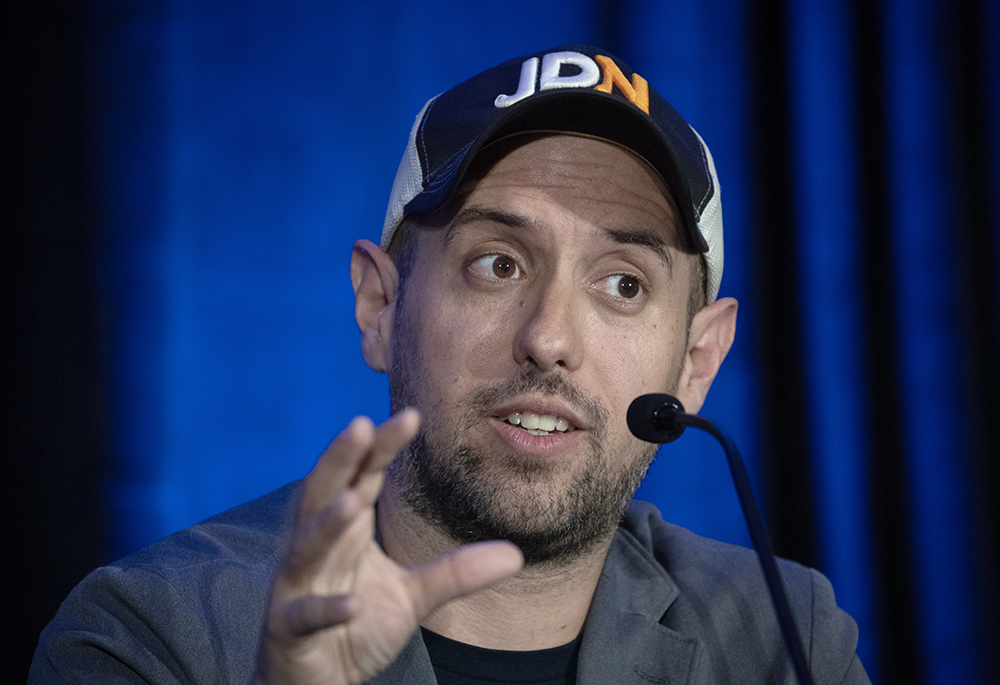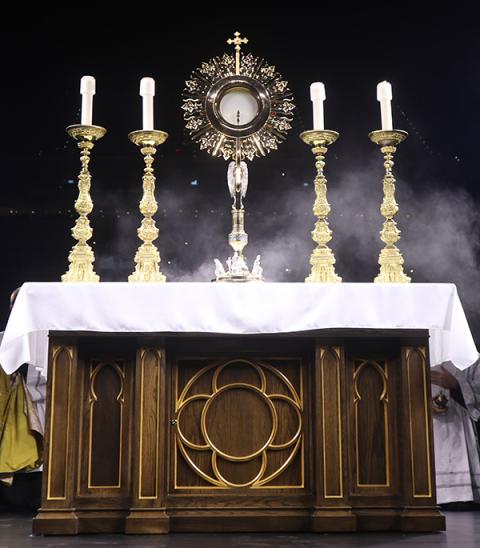
Chicago Cardinal Blase Cupich, right, celebrates Mass at Holy Name Cathedral in Chicago June 30, for the perpetual pilgrims on the Marian Route of the National Eucharistic Pilgrimage and others joining the pilgrimage as it made its way through Chicago. Cupich spoke at the National Eucharistic Congress July 18 in Indianapolis. (OSV News/Simone Orendain)
The Eucharist can be thought of as a school for becoming a more synodal church, Chicago Cardinal Blase Cupich said during a July 18 presentation at the National Eucharistic Congress.
Addressing a hotel ballroom packed with a diverse audience of Catholics, Cupich made several connections between the real presence of Jesus in the Eucharist, the central theme of the congress, and synodality.
"Whenever we take the Eucharist, we gradually become freer to take up the mission of Christ," Cupich said in his presentation, titled "Synodality as a Mode of Being Church."
Cupich, a delegate to the 2021-2024 Synod of Bishops on synodality, described the concept of synodality as a model where Catholics, lay and ordained, dialogue and listen to one another while engaging in communal discernment to navigate the church's path through history.
"We are called to be responsible for one another as we journey through time to what God has promised us," Cupich said.
That process of dialogue and discernment is intricately linked to prayer and the saving mission of Jesus Christ, said Cupich and Bishop Daniel Flores of Brownsville, Texas, who coordinated the U.S. bishops' synod efforts and is also a U.S. delegate to the synod.

Bishop Daniel Flores carries the monstrance as pilgrims process through the streets of Brownsville, Texas, May 19 from the Cathedral of the Immaculate Conception to Sacred Heart Mission. The procession kicked off the St. Juan Diego Route of the National Eucharistic Pilgrimage. (OSV News/Tom McCarthy)
"There is much to think about in the relationship between liturgy and the modus in which the church acts on mission," said Flores, who joined Cupich for a panel discussion on synodality along with José Manuel De Urquidi, a synod delegate for Latin America.
De Urquidi said that prayer and the Eucharist marked the beginning of "everything" at the first global synod gathering in October 2023. Synod delegates will meet again, Oct. 2-27, at the Vatican for their final assembly.
Released June 20, the working document for the synod, known as the instrumentum laboris, asks synod delegates to confront several pressing issues — such as the possibility of women deacons, ordaining married men to the priesthood and better welcoming LGBTQ+ Catholics — in considering how the church can transform and expand its institutional structures.
But taking up those tasks cannot be separated from prayer or being rooted in the Eucharist, De Urquidi said.
"We need to root ourselves in the mission of Jesus," he added.

José Manuel De Urquidi gestures during a panel June 20 at the Catholic Media Conference in Atlanta. De Urquidi, a synod delegate, joined Chicago Cardinal Blase Cupich and Bishop Daniel Flores of Brownsville, Texas, for a panel discussion on synodality during the National Eucharistic Congress July 18 in Indianapolis. (OSV News/Bob Roller)
Framing synodality as what God expects of the Catholic Church in the third millennium, Pope Francis has called for a synodal conversion in the church in part by encouraging the hierarchy to regularly consult the lay faithful and to listen to the experiences of marginalized communities and people on the peripheries of church life.
"Synodality calls us to a new way of thinking about our Christian life, and a new way of being a model for the church," Cupich said.
In keeping with that vision, Cupich reminded his audience, the Vatican in recent years has encouraged the Synod of Bishops to discuss sensitive issues, as well as making it possible for lay Catholic men and women to be fully voting members of the synod.
Those changes, however, have raised concerns among some conservative Catholics, especially in the Anglophone world, that the synod risks undermining the church's teachings on hotly contested issues such as the all-male priesthood, homosexuality and contraception.
Advertisement
Compared to initiatives such as the bishops' three-year National Eucharistic Revival, of which the congress is the climactic event, synodality has had difficulty garnering traction in the United States. Cardinal Christophe Pierre, the Vatican's ambassador to the United States, has at times urged the U.S. bishops to embrace synodality.
Part of the problem, Cupich told his audience on July 18, is the bottom-line, problem-solving mentality that predominates in the United States.
"We struggle with synodality because we want to fix things right away," said Cupich, who added that he believes a crisis of faith exists in the church in the sense that Catholics do not fully understand what it means for Jesus to be risen from the dead.

The monstrance is pictured during Eucharistic adoration at the July 18 second revival night of the National Eucharistic Congress at Lucas Oil Stadium in Indianapolis. (OSV News/Bob Roller)
"The Mass is not about making Jesus present as though he's off in heaven, doing his thing, and we occasionally get an audience with him," said Cupich, who noted that the Second Vatican Council "made it clear" that Christ is "always present in the church, exercising his priestly ministry in the world."
"In the Mass, the focus has to be on what Christ is doing and what happens to us as people and as a community, being transformed to take up more fully his mission to bring justice, peace and love to the world.
"The Eucharist should empower us to take up the mission," Cupich said.
To illustrate synodality in action, audience members were asked to participate in "conversations in the Spirit" where they reflected on how the Mass formed them as Catholics and prepared them to share the Gospel in the world.
Several people said they came away with a newfound appreciation and understanding of synodality.
"I really enjoyed our roundtable discussion. I think it was just so invigorating to hear the experiences that each of us have as we come from different walks of life," said Mary Rose Robbins, a resident of Glen Dale, West Virginia.
Diana Arizmendi, a resident of Waukegan, Illinois, said the exercise in synodality was a "nice reminder of the unity of the church and how the Eucharist really is the food that binds us all together."
"Being gathered here and being able to share with one another," Arizmendi said, "was a great reminder and encouragement that we're all walking toward heaven together, and the Eucharist is really feeding and nourishing us along the way."







